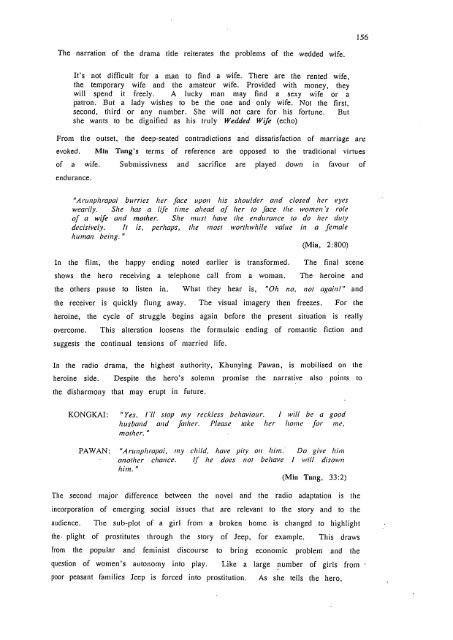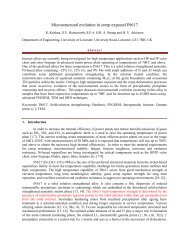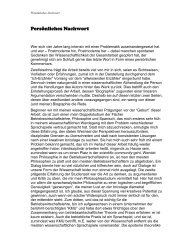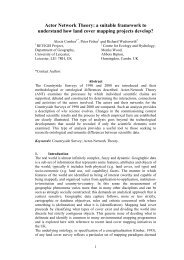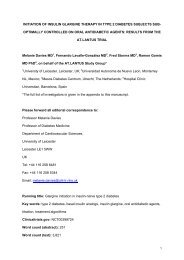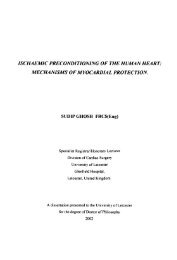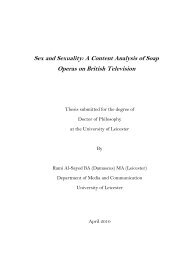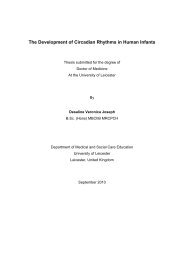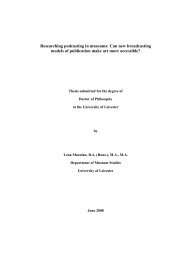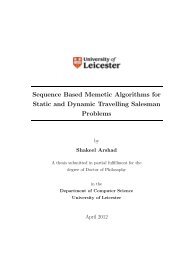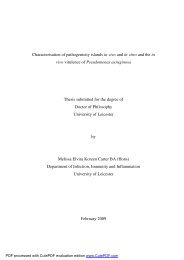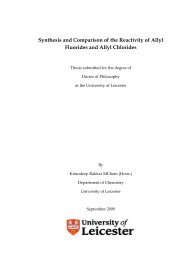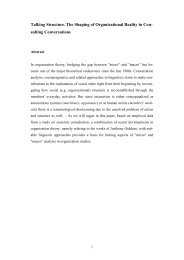iieiiei1eWrkers - Leicester Research Archive - University of Leicester
iieiiei1eWrkers - Leicester Research Archive - University of Leicester
iieiiei1eWrkers - Leicester Research Archive - University of Leicester
You also want an ePaper? Increase the reach of your titles
YUMPU automatically turns print PDFs into web optimized ePapers that Google loves.
The narration <strong>of</strong> the drama title reiterates the problems <strong>of</strong> the wedded wife.<br />
It's not difficult for a man to find a wife. There are the rented wife,<br />
the temporary wife and the amateur wife. Provided with money, they<br />
will spend it freely. A lucky man may find a sexy wife or a<br />
patron. But a lady wishes to be the one and only wife. Not the first,<br />
second, third or any number. She will not care for his fortune. But<br />
she wants to be dignified as his truly Wedded Wife (echo)<br />
From the outset, the deep-seated contradictions and dissatisfaction <strong>of</strong> marriage are<br />
evoked. Mia Tang's terms <strong>of</strong> reference are opposed to the traditional virtues<br />
<strong>of</strong> a wife. Submissivness and sacrifice are played down in favour <strong>of</strong><br />
end u ran ce.<br />
"Arunphrapai burries her face upon his shoulder and closed her eyes<br />
wearily. She has a life time ahead <strong>of</strong> her to face the women 's role<br />
<strong>of</strong> a wife and mother. She must have the endurance to do her duty<br />
decisively. 11 is, perhaps, the inosl worthwhile value in a female<br />
human being.<br />
(Mia, 2:800)<br />
In the film, the happy ending noted earlier is transformed. The final scene<br />
shows the hero receiving a telephone call from a woman. The heroine and<br />
the others pause to listen in. What they hear is, "Oh no, not again!" and<br />
the receiver is quickly flung away. The visual imagery then freezes. For the<br />
heroine, the cycle <strong>of</strong> struggle begins again before the present situation is really<br />
overcome. This alteration loosens the formulaic ending <strong>of</strong> romantic fiction and<br />
suggests the continual tensions <strong>of</strong> married life.<br />
In the radio drama, the highest authority, Khunying Pawan, is mobilised on the<br />
heroine side. Despite the hero's solemn promise the narrative also points to<br />
the disharmony that may erupt in future.<br />
KONGKAI: "Yes, I'll slop my reckless behaviour. I will be a good<br />
husband and father. Please take her hone for me,<br />
mother.<br />
PAWAN: "Arunphrapai, my child, have pity on him. Do give him<br />
another chance. If he does not behave I will disown<br />
him.<br />
(Mm Tang, 33:2)<br />
The second major difference between the novel and the radio adaptation is the<br />
incorporation <strong>of</strong> emerging social issues that are relevant to the story and to the<br />
audience. The sub-plot <strong>of</strong> a girl from a broken home is changed to highlight<br />
the plight <strong>of</strong> prostitutes through the story <strong>of</strong> Jeep, for example. This draws<br />
from the popular and feminist discourse to bring economic problem and the<br />
question <strong>of</strong> women's autonomy into play. Like a large number <strong>of</strong> girls from<br />
poor peasant families Jeep is forced into prostitution. As she tells the hero,<br />
156


